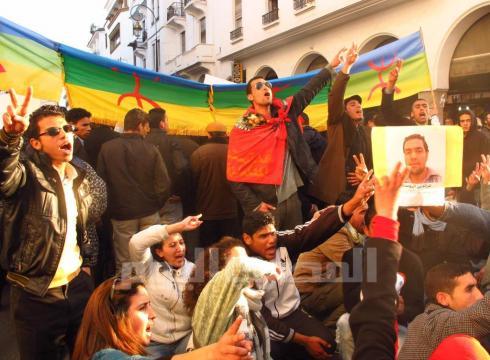
CASABLANCA, Morocco — A few thousand people gathered Sunday in Morocco’s cities to mark the one year anniversary of the North African kingdom’s local version of the Arab Spring uprisings.
The modest turnout was in sharp contrast to the tens of thousands that once flocked to the 20 February movement’s banner early last year.
About 1,000 people turned out for a sit-in at Casablanca’s main square. In the capital Rabat, at least 1,500 marched through the center of town chanting slogans and singing songs.
The demonstrations last year prompted the king to amend the constitution to curtail is powers and hold early elections, which were won by an Islamist opposition party promising reforms. Since then, demonstrations petered out.
Activists say many of their demands remain unmet, including fighting corruption, releasing prisoners of conscience and decreasing the absolute power of the king.
While activists in Casablanca acknowledged that their numbers were down, they pointed out that a protest such as this, filled with young people, would have been unthinkable a year ago.
“It is not bad to be able to do a sit-in for two days and discuss issues in the open air,” said Larbi Menouzi, who has attended nearly every one of the weekly demonstrations held in Casablanca for the past year.
The main square of Morocco’s largest city, flanked by the central bank, city hall and main post office, was filled with people enjoying a sunny winter’s day, along with the knot of protesters, a few dozen of whom spent the night on the square in tents.
Banners above their tents demanded the new parliament be dissolved, those stealing public money be prosecuted and all prisoners of conscience be released.
Activists say the sit-in will continue until their demands are met, a conscious echo of the sit-in at Cairo’s Tahrir Square at the center of Egypt's uprising.
“Before people were too scared to speak and now they do. The 20 February movement has been a catalyst and people are now mobilized everywhere,” Souad Guennon said.
Placards and photos around the square testified to the breadth of movements across the country, describing striking villagers at a distant silver mine, residents bulldozed out of informal housing and clashes with police in a mountain town.
Omar Radi, an activist with movement, took heart in the turnout in Rabat, which was higher than it had been in months, though still far below the large demonstrations that characterized its early days.
“This is the biggest demonstration in Rabat in a while, which gives us hope,” he said activists chanted around him. “Like all movements, this has had its ups and downs, but the spirit of the 20 February is all over the country.”
The New York-based Human Rights Watch, meanwhile, condemned the trial of activists of the 20 February movement arrested for advocating a boycott of the 25 November elections.




